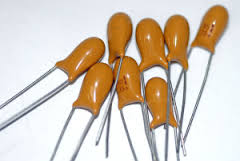Antitrust Division Announces First Guilty Plea in Capacitor Cartel Investigation
 The Department of Justice’s far-reaching criminal investigation into the alleged electronic capacitor cartel has borne fruit – NEC Tokin Corporation agreed to plead guilty and pay a $13.8 million criminal fine for conspiring with competitors between 2002 and 2013.
The Department of Justice’s far-reaching criminal investigation into the alleged electronic capacitor cartel has borne fruit – NEC Tokin Corporation agreed to plead guilty and pay a $13.8 million criminal fine for conspiring with competitors between 2002 and 2013.
NEC Tokin’s plea is the first criminal plea in this investigation, and the electronics manufacturing company also agreed to cooperate in the Antitrust Division’s ongoing investigation.
Under the Antitrust Division’s well-established leniency policy, it is likely that another undisclosed company has been awarded leniency as the first company to report participation in the illegal capacitor cartel. Press reports indicate that a Japanese corporation applied to the Justice Department’s leniency program.
The Justice Department’s announcement was expected as part of a global antitrust investigation focusing on cartels among electronic parts suppliers. The investigation involves the United States, the EU, Brazil, China, Korea, and Japan.
Last June 2014, Japanese investigators raided eight capacitor manufacturers for involvement in the global cartel. Chinese authorities raided two Japanese manufacturers in China, NEC Tokin and Taiyo Yuden. Both NEC Tokin and Taiyo Yuden have announced that they are cooperating with the global investigation.
Electronic capacitors are used in a variety of electronic products, including computers, car engines and airbag systems, home appliances, and office equipment. The price of each capacitor is small but the number used is significant for each electronic product.
Several class action suits have been filed alleging a global cartel among capacitor manufacturers. Most of the defendants are based in Japan and have US subsidiaries, including Panasonic, Fujitsu, Hitachi, Sanyo and other Japanese companies.
The Justice Department’s focus on Japanese companies that manufacture electronic capacitors is another in a long line of Japanese-based industries prosecuted for criminal cartel conduct.
The Antitrust Division has prosecuted over 20 Japanese companies for price-fixing activities in a variety of high-tech markets, including liquid crystal displays, cathode ray tubes, optical disk drives, and dynamic random access memory chips.
The electronic capacitor cartel investigation also follows the Antitrust Division’s successful, and continuing, investigation of global auto parts suppliers that focused on a number of Japanese companies.
The size of the electronic capacitor market is enormous and stretches into a variety of electronic products. It is likely that the capacitor investigation will identify related markets in which cartel participants may have engaged in illegal collusion.
 The Antitrust Division has a strong prosecution record when uncovering cartels. With the assistance of the leniency program, participant companies in the cartels have significant incentives to uncover cartel activity in related markets, disclose the existence of the cartel, and reap significant benefits to avoid criminal penalties.
The Antitrust Division has a strong prosecution record when uncovering cartels. With the assistance of the leniency program, participant companies in the cartels have significant incentives to uncover cartel activity in related markets, disclose the existence of the cartel, and reap significant benefits to avoid criminal penalties.
The auto parts investigation is a perfect example of how the Justice Department can leverage one criminal investigation of a cartel into separate but related markets. The Justice Department has prosecuted over 30 companies and 30 individual executives for participation in the criminal conspiracy.
With the recent announcement, and given the background, the Justice Department may be on the beginning of a journey that could eclipse the auto parts investigation in the number of companies and executives criminally prosecuted.















